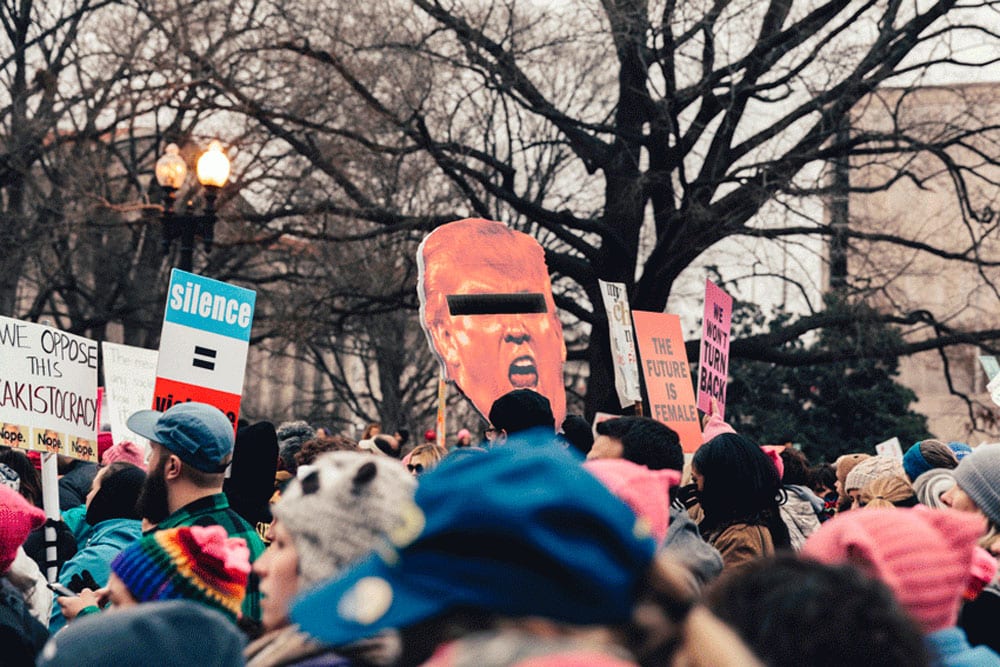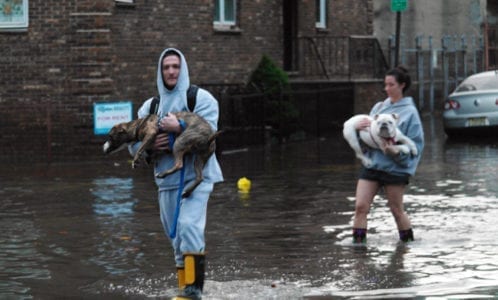More jaw, less culture war—the case for citizens’ assemblies
If climate is becoming the latest battleground in the ‘culture wars’, should we just refuse to fight? Instead of facing off against massed armies in ranged battle driven by deep pockets, Lucy Stone argues, perhaps we should throw down our arms and look to see not just the white of each other’s eyes, but the person behind them.—A plea for deliberative democracy.
“To jaw-jaw is always better than to war-war.”
—Winston Churchill, June 26, 1954
Culture wars have again become a defining feature of modern politics. They flare up in moments when it feels as if what is at stake is the very identity of a nation, and the population divides politically along moral and value lines rather than class, geography, economy or more structural differences that have typically divided a population. Increasingly, all issues are being drawn into this theatre of war and polarised.
Polarisation is the result of the presentation of a war between the binary us and them. Both poles try to draw the people stranded on a vanishing middle ground by exposing the treason/immorality/hypocrisy of the other side. The spectre of loss to the opposing side (whether deplorables or the swamp/ remainiacs or brextremists) is raised as a way to generate high levels of attention and mobilisation. It is around those axes that the vortex of the culture war is revolving, sucking more issues into its gravitational pull.
Fox News’ depiction of climate change as a hoax perpetrated by the elites to take away pick-up trucks and burgers that define the culture of rural and small town America, is one example of how climate has becomes a culture war. Pro-climate campaigners are therefore urged to join the culture war, to fight the battle. Is this though, counterproductive?
Rejecting the formulation of war is a more productive way forward than to hope that memes, opinion pieces, disinformation campaigns and rapid rebuttals will convince and rouse to action the masses we need to carry off the solutions for the environmental, social and political crises we all face.
The war mentality suits those who would divide us. War is a zero-sum game where one side wins and the other loses. We could try to win the culture war by positioning fossil fuel promoters as the elite rather than climate scientists and environmental campaigners. But who really wins if we’ve simply created more polarisation?
Another reason not to engage in the war is that climate already has cross-cultural support, with 85% of people expressing concern over the climate—the highest levels ever. The push to drag it into a battlefield in the culture war is an attempt to undo this, and if we suit up to do battle in this theatre, we risk splintering this point of commonality. This is what those that oppose climate action want.
Those who would turn climate change into a skirmish in the culture war are hoping that the tribal allegiances that manifest in other issues will fracture these high levels of alignment. In other cultural battlefields, the spoils have been new recruits. With 85% expressing concern, there is a large pool to capture.
Often past attacks have been cloaked in humour and designed to generate a righteous outrage from purists who then alienate those who are not perfectly aligned. Another mechanism is the highlighting of hypocrisy among proponents, turning people away from leaders. Any army that sets itself up only in defence of the pure, will dwindle rapidly. The imperfect are labelled hypocrites (most of us locked into high carbon systems) and those who strive for integrity as ridiculous (going on a slow boat rather than fly to a climate conference). Conversely their opponents are tagged as duplicitous and those in agreement their dupes. How can people forge common purpose when the other side is seen in such unfavourable terms and they feel unfairly maligned.
Instead we should seek, through deliberative democratic processes, to build on what commonality exists. This happens when people get together, face to face instead of firing off salvos from behind the keyboard.
The mythical ‘Christmas truce’ of WW1 when British and German soldiers came over the trenches to sing carols and play football, turns out not to have been a poignant one off. We now know that this in fact happened regularly but was such a closely guarded secret because its potential to undermine the war. When tribes come into close hand to hand combat, you can hear, smell and see your enemy in such close proximity, you see your common suffering and humanity. Not only this but evidence shows soldiers became so aware of what they had in common, troops would turn on their own commanders rather than fire at each other.
This is where deliberative democracy comes in. Deliberative Democracy can undermine the culture wars, because it brings the troops together where they can see in broad daylight that they have more in common with each other than with their commanding generals whether Bannon or Bloomberg.
The other danger of engaging in a culture war is that it creates a sense of anxiety and threat perception, which in turn reduces our capacity for collective decision making. The insights from Collective Psychology show that threat perception drives individual and collective anxiety which can be paralysing. This also applies to the framing of climate change as a war to be fought—something nearly all climate campaigns do. Run well, citizens assemblies have the potential to move participants and the public away from paralysing and polarising threat responses and into collective visions.
In a polarising UK, and wider world, it is hard to see how we can respond to the nature and scale of climate change when agreement in one domain seems impossible to muster, let alone agreement to change across most elements of our lives.
The process of a citizen’s assembly tends to curb the extremes, and over time allow the group, and the connected public, to move from reactions to understanding. Deliberative democracy typically results in participants moving from polarised positions to compromise, and often surprise their commissioners by coming out with more ambitious recommendations that initial polling indicates.
The research from Collective Psychology highlights three transitions necessary if we are to address climate change and mass extinction; from fight or flight response to self-awareness, from powerlessness to agency, and from disconnection to belonging.
Faced with members of different communities with different views, participants in Citizens Assemblies are guided out of their entrenched positions and instead given an opportunity to reflect, assess and develop an awareness of their position in context. By involving participants and the public in the conversation they stop being acted upon and become actors with agency in the policy—even when the outcome is not exactly as they would have hoped. Being a part of the discussion creates a belonging as fellow citizens.

The divisions highlighted by Brexit and the election of Donald Trump, are a sign of disenchantment with globalisation. Matthew Taylor writes that the message of globalisation contributed to the frustrations manifest today. Globalisation and its trade-offs, he argues, was presented as inevitable, too complicated for ordinary people to grasp, and was overall better for everybody and so we should accept that the losers must “accept their fate and adapt”.
The Gilets Jaunes could be the sign of what comes from treating climate change policy in the same way, while well run citizens assemblies will do the exact opposite. By inviting the public into the deliberation, these assemblies acknowledge that the policies are not a forgone conclusion, they grant agency to people and treat them respectfully despite the complex nature of the problem, and importantly, they involve people and communities who will be impacted into the negotiation.
As well as undermining the culture war and strengthening collective decision making, deliberative democratic processes also offer a way to break a political impasse and overcome the inertia that halts the progress of climate policy that is up to the challenge we face.
Politics as usual will certainly not be able to deliver the far -reaching changes required over the next decade, in how we eat, travel, live and consume. This autumn, unless delayed or dwarfed by a crash-out Brexit or general election, will see parliament hold a citizen’s assembly on climate change. In fact, if it runs in parallel, it could be the tool to ensure climate doesn’t get caught up in the Brexit/election culture clashes. Despite the mess of Brexit and apparent distrust of politicians, there would seem to be a hunger for more not less democracy—with a groundswell of ‘mini publics’ popping up across the country. This step could be the first towards a wholesale rethink of the policy response needed to address climate change—opening it up to the public.
A citizen assembly, a bit like jury service, randomly selects demographically representative members of the public to be paid to meet over several weekends to deliberate on a chosen topic. Citizen assemblies have come out of niche academic democratic reform circles as a new tool for climate (and indeed Brexit and other thorny issues where polling or referendum are inadequate tools alone), in large part because Extinction Rebellion made it one of their three ‘demands’ of government. It is also because of the way the Irish Citizen Assembly generated a public mandate for new policies on tricky and polarising topics like abortion, aging and fixed term parliaments. We actually have a rich history of citizen assemblies to draw lessons from—including a DEFRA citizen summit on climate in 2007—to ensure the benefits of this process can be realised.
Citizen assemblies, and other deliberative democracy ‘mini publics’, provide ways to ensure a diversity of opinion is mediated, and compromise is facilitated. In these ways, a ‘good citizen’ is given mechanisms for listening to more voices, recognising different perspectives and creating empathy. Their outcomes signal to politicians that the population will demand or at least tolerate policy paths previously ignored.
To counter populism’s exploitation of climate as a culture war, we can learn from organisational theory, as pointed out by Charles Seaford in a recent CUSP article, which shows that belonging to a tribe entails loyalty to the organisational (its history) and the other is loyalty to its purpose (which tends to be associated with innovation, tolerance). So rather than attacking loyalty to a tribe of a community, we should focus on shifting the outward purpose of the tribe so that it is focused on climate progress.
There is no quick fix for climate change. The parliamentary citizen assembly cannot remain a one-off niche parliamentary experiment behind closed doors. A wide programme of engagement, and an assembly which stands for at least five years, the people’s house, would acknowledge the ongoing and evolving nature of meeting the challenge of climate change. The challenge is complicated, but ordinary people can be invited in and it will take time. The outcome is not inevitable, but adaptive. First, we need to start by opening up a national conversation on climate change from village halls to Westminster. Perhaps this way climate change might even become the peace envoy that heals a divided Brexit Britain.




